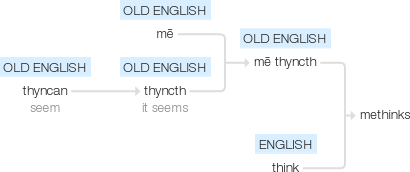Methinks
Old English mē thyncth, from mē ‘to me’ + thyncth ‘it seems’ (from thyncan ‘seem’, related to think).
wiktionary
From me(“object pronoun”) + think(“to seem”). In Early Modern English, used at least 150 times by William Shakespeare; in Middle English by Geoffrey Chaucer, me thinketh; and in Old English by Alfred the Great, mē þyncþ. Compare synonymous German mich dünkt, Old Norse mér þykkir (Icelandic mér þykir).
etymonline
methinks (v.)
"it appears to me" (now archaic or poetic only), from Old English me þyncð "it seems to me," from me (pron.), dative of I, + þyncð, third person singular of þyncan "to seem," reflecting the Old English distinction between þyncan "to seem" and related þencan "to think," which bedevils modern students of the language (see think). The two thinks were constantly confused, then finally merged, in Middle English. Related: Methought.
